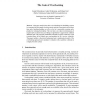Free Online Productivity Tools
i2Speak
i2Symbol
i2OCR
iTex2Img
iWeb2Print
iWeb2Shot
i2Type
iPdf2Split
iPdf2Merge
i2Bopomofo
i2Arabic
i2Style
i2Image
i2PDF
iLatex2Rtf
Sci2ools
106
click to vote
JSSPP
2009
Springer
2009
Springer
The Gain of Overbooking
This paper analyzes the effect of overbooking for scheduling systems in a commercial environment. In this scenario each job is associated with a release time and a finishing deadline as well as a fee for a successful execution and a penalty for violating the deadline. The core idea is to exploit overestimations of required job execution times, providing an opportunity to aggressively schedule additional jobs. The proposed probabilistic scheduler is based on histories of job execution times, device failure rates, and penalties for SLA service violations. This paper includes a theoretical background and a mathematical model of the overbooking approach and a simulative evaluation with a synthetic workload on a single-processor system.
Distributed And Parallel Computing | Job Execution Times | JSSPP 2009 | Required Job Execution | Successful Execution |
| Added | 27 May 2010 |
| Updated | 27 May 2010 |
| Type | Conference |
| Year | 2009 |
| Where | JSSPP |
| Authors | Georg Birkenheuer, André Brinkmann, Holger Karl |
Comments (0)

